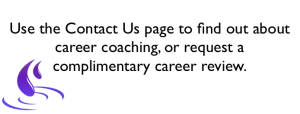 Have you sat down with your manager yet to work on a career development plan? The month of January is often the time for your annual career development conversation (for some companies this is done at the of the year, in December, rather than the beginning, or is tied in with the organisation’s financial year).
Have you sat down with your manager yet to work on a career development plan? The month of January is often the time for your annual career development conversation (for some companies this is done at the of the year, in December, rather than the beginning, or is tied in with the organisation’s financial year).
Self-evaluation is the KEY to career development
In most cases, companies ask their employees to complete self-evaluations for their managers to review. This is a great opportunity to communicate with your supervisor and remind him or her all the things you have accomplished throughout the past year, the projects you were assigned and completed successfully and in general the reasons you were hired at first place (if you are keeping a “brag list” it will be so much easier to remember everything and sort out the most important ones). And, if this is a long list and you are ready for it, you could also get that promotion you are after.
However, you have to be completely honest with yourself. We are not entirely 100% strengths; we also have weaknesses. Think honestly about yours. What are the areas where you could improve? Considering all the projects and tasks you were involved with during the past year, where do you feel you could have done better? Assuming you were asking for feedback, you should consider the feedback you’ve received throughout the year as well to list your improvement areas.
As soon as you build that list, you’ll have to come up with an action plan. What are you going to do about your weaknesses and your professional development? How are you going to improve these skills? Maybe you need additional training, practice, or more experience. Maybe you need your manager’s help on this by providing you with opportunities to take on responsibilities, to lead, to undertake challenging tasks, or to take a class you need.
If you include all this information within your self-evaluation, you will have a meaningful discussion with your manager during the annual employee evaluation process, and you will be ready to take your career one step further.
Martha Austin, in her article in FedSmith, gives a different perspective to developmental areas. She provides a framework for you to use to present them to your boss in a way as she states, “to turn the Career Development Conversation into something that brings out the best in both the employee and supervisor“.
In most cases the employee is supposed to come to the meeting having identified three areas of strength and three “Developmental Areas” to work on in the coming year. (…)
So of course the employee walks into the session knowing that no matter how wonderful their strengths are, and no matter how dedicated they’ve been to their work, at some point there will be a discussion about how they fall short. And if the employee has not identified three Developmental Areas, the supervisor will identify them for him.
This is a No-Win situation all around. The only thing more disempowering than looking at yourself and identifying the things that are wrong with you is having your supervisor do it for you. And we wonder why employees and supervisors alike HATE these conversations.
There is a more useful way to define Developmental Areas…
Read the whole article here: “Your 3 Most Important ‘Developmental Areas’”

Image courtesy of Ambro, FreeDigitalPhotos.net
 2014 has finally arrived, and among the wishes we all exchanged for this year, is achieving career success. We have already made our
2014 has finally arrived, and among the wishes we all exchanged for this year, is achieving career success. We have already made our  Now that 2013 departs and 2014 is upon us, it’s the time of the year we are establishing our career resolutions and goals for the coming year. Apart from losing weight, falling in love, or saving money, research shows that career-related New Year’s resolutions are in the top ten most popular ones. According to Forbes, “
Now that 2013 departs and 2014 is upon us, it’s the time of the year we are establishing our career resolutions and goals for the coming year. Apart from losing weight, falling in love, or saving money, research shows that career-related New Year’s resolutions are in the top ten most popular ones. According to Forbes, “
 The holiday season has just begun and you have a lot of plans for the next ten days. Whether they are family get-togethers, going out with friends, or glamorous parties, there is no doubt that you want to look your best.
The holiday season has just begun and you have a lot of plans for the next ten days. Whether they are family get-togethers, going out with friends, or glamorous parties, there is no doubt that you want to look your best. Do you believe in Santa Claus? Well, children certainly do! Kendra Y. Mims in her article in ‘She Knows’, has listed some of the cutest letters to Father Christmas you will ever read! These kids’ way of thinking, and what they have to say, is just amazing! As the author says (and I couldn’t have described it better), “It’s always touching when kids think about others before themselves, especially during Christmas”.
Do you believe in Santa Claus? Well, children certainly do! Kendra Y. Mims in her article in ‘She Knows’, has listed some of the cutest letters to Father Christmas you will ever read! These kids’ way of thinking, and what they have to say, is just amazing! As the author says (and I couldn’t have described it better), “It’s always touching when kids think about others before themselves, especially during Christmas”.